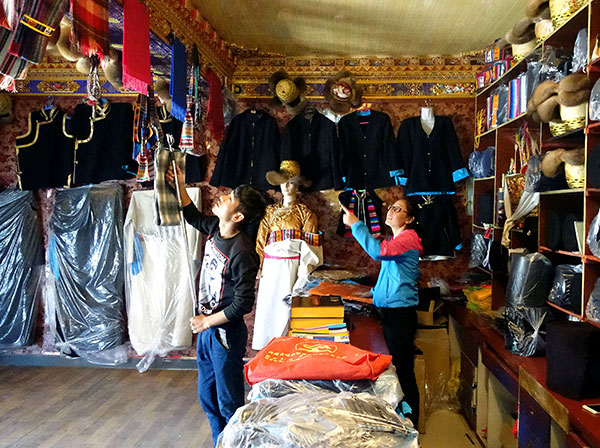|
 A store selling traditional Tibetan clothes in Shannan prefecture, Tibet. Wang Zhuangfei / China Daily |
Until recently, Gyatso rarely worried about his business.
That's no surprise though, because the 50-year-old entrepreneur was born into a nomadic family in the Aba Tibetan and Qiang autonomous prefecture in Sichuan province, an area where people from the Tibetan ethnic group are reputed to have been "born with the golden touch".
Since leaving home in the 1980s to conduct business in Dagze, a county in the Tibet autonomous region, and later Nepal, he has developed his company into one of the region's most successful producers of Tibetan incense.
The company, Tibet YouGeTsang Enterprises, makes incense from medicinal plants that repel mosquitoes and rats, but, in accordance with Buddhist beliefs, don't kill them. The products are available in most provinces, and even in overseas markets such as Spain, Australia and the United States.
Last year, Gyatso decided to change his business model. "What I learned was that e-commerce reduces costs and raises profits. Our traditional sales channels have a profit margin of about 30 percent, but that rises to 40 percent when we sell online," he said.
A random search on Taobao, China's biggest online marketplace, results in several pages of Tibetan products, including rings and necklaces, clothes and home decorations, traditional medicines and other herbal treatments.
The rapid development of information technology and Tibet's fast-growing logistics industry mean many Tibetans now buy items via smartphones or websites. A 2014 consumer spending report by Alipay, the payment arm of e-commerce giant Alibaba Group, showed that Tibet had the highest share of mobile payments in the first 10 months of the year, with 62.2 percent of the regional population making transactions.
On Nov 11, people in Tibet spent 41.38 million yuan ($6.67 million) in 16 hours on Taobao to celebrate "Singles' Day", an ironic Chinese rereading of Valentine's Day. No figures are available to indicate how much was spent inside and outside the region, but for businesspeople such as Gyatso, the trend is obvious.
Last year, he opened an online incense store on Taobao, but sales were poor in the first three months. Gyatso said the main obstacle for businesses such as his is the lack of sales professionals who can promote goods effectively in online marketplaces. "Only a few of my employees know how to use a computer, let alone promote our products in online marketplaces," he said.
He plans to hire at least 20 Internet-savvy employees this year to help him explore the online market. "Everything is hard at the beginning," he said. "It's like raising a child - difficult in the first few months, but things become easier as the child grows up."
The job of promoting online commerce in the region has fallen on the shoulders of the younger generation.
When he graduated from Tibet University in Lhasa in 2011, Kalzang Tsetan, 27, turned down an opportunity to become a government employee, a dream job for many Tibetan graduates. Instead, he returned to his hometown in Gyangze county and joined his aunt's garlic-selling business. "I went to college in a big city, so I've been exposed to new ideas, including the Internet," he said.
Last year, his aunt gave him the task of exploring the online garlic market and boosting sales outside Tibet. In response, he opened an online store, but sales were low, which he attributes to poor brand recognition outside the company's home region.
"We still have so much to learn," he said.
Luo Wangshu contributed to this story.